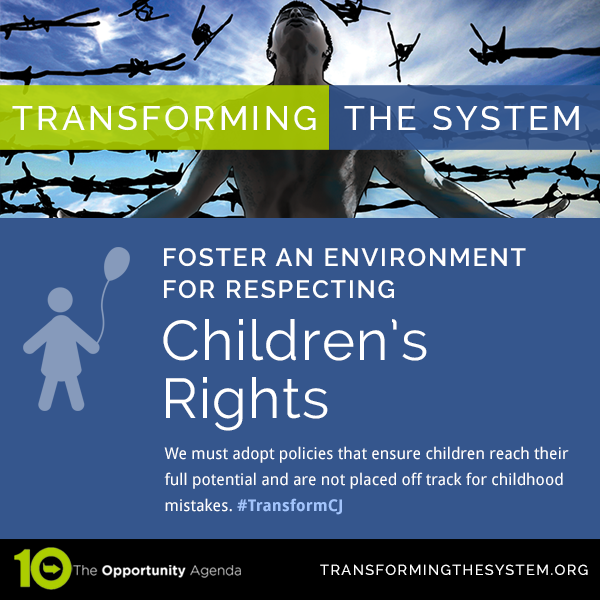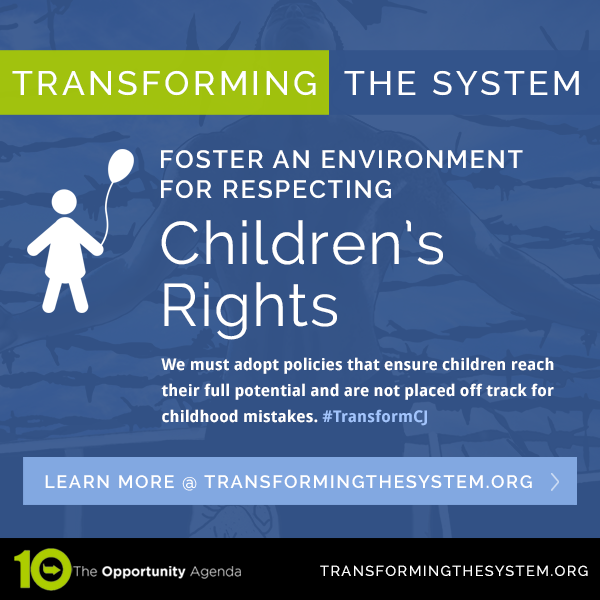Ensuring that children are treated appropriately for their age
The juvenile justice system has made inroads, leading to a 45% reduction in juvenile incarceration since the 1990s. However, additional work needs to be done to ensure that young people are not treated as adults in the criminal justice system; alternatives to incarceration are fully developed; facilities are rehabilitative and appropriate for all children, specifically by ensuring that juvenile facilities for girls are examined through a gender-specific lens and developed to accommodate their needs; and young people are not exposed to abusive conditions when incarcerated. In 2012 the U.S. Supreme Court found that mandatory life without parole was unconstitutional as it violated the Eight Amendment. The ruling in Miller v. Alabama, required both states and the federal government to consider the particular circumstances of the juvenile defendant in determining their individual sentence. The 2016 case, Montgomery v. Alabama, ensured that that decision was applied retroactively.
Congress, the Department of Justice, and state legislatures should:
- Strengthen the Juvenile Justice and Delinquency Prevention Act, which focuses on the prevention and control of crime conducted by young people and improving the juvenile justice system, and support evidence-supported programs with technical support, incentive grants, and information sharing;
- “Expand flexibility in funding, so that local jurisdictions may spend funds now used for housing some of their youths in large state youth lockups on less costly community-based programs supported by research. Effective community-based models include multi-systemic therapy, victim-offender mediation, mentoring, vocational programs, and group homes modeled after those in Missouri for youths that require a residential setting;”
- De-incentivize programs that have been proven ineffective at reducing the rate of juvenile offenses, such as “Scared Straight” and boot camps programs;
- Eliminate the automatic transfer of young people into adult courts;
- Abolish life without parole for offenses committed before the individual was 18 years of age;
- “Approve standards recommended by the National Prison Rape Elimination Commission addressing the prevention, detection and response to sexual misconduct in facilities that incarcerate adults and youth;”
- “Collect better data about pregnant girls in the juvenile justice system, and support provisions in the reauthorization of the [Juvenile Justice and Delinquency Prevention Act] JJDPA to improve data collection regarding this population;”
- Issue guidelines and trainings on best practices for juvenile justice administration and facilities;
- “Implement evidence-based practices to increase the effectiveness of juvenile probation and parole, such as graduated sanctions that respond to each violation of the rules of supervision with a swift, sure, and commensurate sanction. Graduated incentives should also be employed to reward exemplary conduct. Research has demonstrated graduated responses are far more effective because they send a clear message at the time of the behavior rather than waiting for relatively minor violations to pile up and then applying the ultimate sanction — revocation to a youth lockup;”
- Create a national mechanism by which juvenile records are automatically expunged or sealed once the child turns 18;
- Require the collection of publicly-available data, disaggregated by race, religion, sex, gender, gender identity/expression, age, housing status, sexual orientation, HIV status, ethnicity, sexuality, immigration status, national origin, and religious affiliation, on the juvenile justice system at various points; and
- Adopt protocols for promptly addressing racial, ethnic, gender, and other unwarranted disparities the disaggregated data reveal.
Congress and state legislatures should require:
- Collaboration between the juvenile justice system and the child welfare systems;
- Develop and fund gender-specific programs that enhance girls’ cultural strengths, promote trauma recovery, and provide information on female health and contraception;
- Provide mental health services that are sensitive to various genders and gender expressions and sexualities;
- Fund services for LGBTQ youth and youth who have left their homes and reauthorize the Runaway and Homeless
- Youth Act programs for $165 million for financial year 2017;
- Develop independent monitoring systems for facilities; and
- Develop racial impact strategies to eliminate racial disparities in the juvenile justice system.




